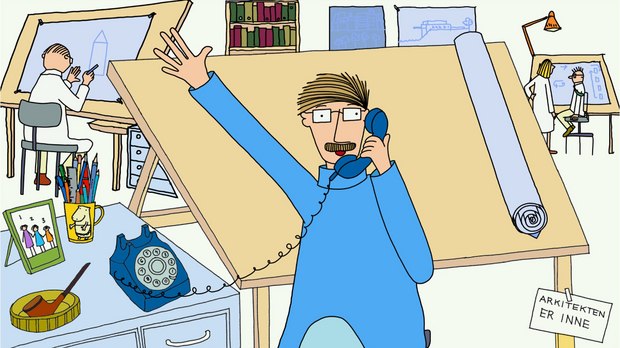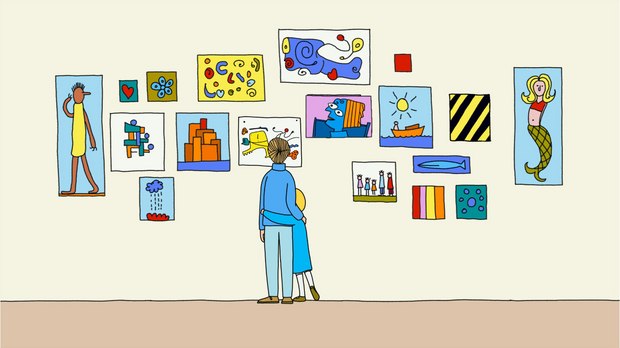The Oscar-winning director discusses her film about a special bike and the difficulties of being honest in our closest relationships.

All images unless otherwise noted © 2014 Mikrofilm As and The National Film Board of Canada. All rights reserved.
In the many years I’ve known animation director Torill Kove, I’ve always been struck by her extraordinarily gentle but captivating storytelling style, which stands in stark contrast to the mind numbingly dull excuse for narrative that all too frequently inhabits short film these days. Her new film, Me and My Moulton, is her third short, following in the footsteps of Oscar-nominated My Grandmother Ironed the King’s Shirts (2001) and Oscar-winning The Danish Poet (2006). Once again, Kove has crafted an exceptional tale filled with warmth, humor and most of all, captivating themes we recognize all too well from our own lives.
The most autobiographical of her films, Me and My Moulton takes us back to Kove’s childhood in Norway, where she tried desperately to fit in, to be honest with the people in her life and to make sense of a world that seemed so odd and difficult to understand. I recently had a chance to speak with the director about tackling topics from one’s own past as well as the inherent difficulties in finding success making independent animated shorts.
Dan Sarto: So tell me about your new film, Me and My Moulton.
Torill Kove: Well, the film tells the story of me and my family when I was little and how weird I thought things were. It’s not a story of an unhappy childhood. It’s a story about looking back and making sense of things I thought were strange at the time. They still seem strange, but I try to put them in perspective. A Moulton is a particular type of bike. It has tiny wheels and was the first bike you could take apart and travel with. It was the first designer bike. That was its claim to fame. And my parents got one for my sisters and me when we were kids.
The film is drawn and colored in a similar way to my previous films. It’s also narrated in a similar style. It might actually work as the third film in a trilogy package.
My work history over the last four years has been a little complicated. I started working on Moulton, produced both by the NFB and the Norwegian production company Mikrofilm. I was about halfway through the project when I was offered a chance to direct a feature in Norway called Hokus Pokus Alfie Atkins. So after working things out with the Film Board, I said yes to doing the feature. It’s a kid’s film that was released last summer in both Norwegian and Swedish. It was a good experience. After you’ve made several shorts, people tend to ask when you’re going to do a feature. It was never really my goal but I enjoyed making the film.
It was supposed to take one and half years, but it took almost two and a half years. But after completing the feature I came back to the NFB and finished my short.
DS: Did you come back with a different perspective on how you were going to finish the film, or was it like you had just stepped away for some coffee and picked things up exactly as they had been upon your return? How different did it feel?
TK: I kept in touch with the film while I was working on the feature. I certainly felt like I’d been away, but I didn’t really change my mind about the type of film I wanted to make. It pretty much came out the same way I’d intended from the start.
DS: Your films are so personal, so gentle and deliberate in their narrative. Describe your initial creative process on this film. How do you start collecting ideas? Did you start by writing? Did you start with images?
TK: It’s really a very quiet, invisible process. For a long time, I’ll just think about a story. A quiet moment before bedtime, some time here and there during the day. It’s wordless thinking, really focusing on a memory of an emotional experience, trying to understand what it was. Was it happiness? Was it grief? Was it love? Confusion…loss…pride? I try to put that into some type of context. I try to think of examples where I can illustrate how those feelings come about. That becomes the thought lab for the next step.
That sits there and stews for a while. Then, I write.
DS: You write before you draw?
TK: Yes. Always. I’ve never taken any proper writing courses, but I’ve read things on different writers’ writing processes. One thing that has always stuck with me is the advice that, when you sit down to write something that isn’t quite formulated yet, write what comes into your mind, the stream of consciousness. Sort it out later. So, I put things onto index cards and work them together later.
DS: So you write a full script before you start your visual development?
TK: Yes. I go from the script to creating some isolated sketches. I did things a bit differently with Moulton. I worked visually much like I’d done the writing. I had a huge wall and just put stuff up that I felt had a connection to the story. It could be a quote from someone, an image, a newspaper clipping, really anything.
From there, I moved to finding specific things I wanted to use in specific parts of the story. I really like the idea of having an opening where this happens, or somewhere in the story I’d like to include this image. I did this for a while before I did my storyboard, scene by scene, including the material I’d assembled for different segments of the story.
DS: So the story of Me and my Moulton is about your own childhood…
TK: Correct.
DS: Do your siblings share the same feelings about your parents’ personalities and the events you depict?
TK: They definitely share the same feelings about the three main things in the film – the moustache, the dresses and the bike. These are stories we’ve told each other countless times over the years. We keep picking at them because in retrospect, they are very funny. The first time we sat around a table and talked about these experiences, my parents were both alive. We had such a great time. It was one of the happiest memories I have of my family since I became an adult. We had a great meal and talked about the old days in this warm, funny way. My parents thought it was hilarious.
Sometime later, after my father had passed away, my sisters and I were with my mother and we started talking about these issues again. This time my mother got really upset. She became very defensive. She said things like, “It wasn’t easy raising three kids in those days on the kinds of salaries we were making…we were always tired…I made the dresses for you because we couldn’t afford new ones.” All of these things I had instinctively known as a child, you can’t talk about these things because it’s hurtful. Well, they all came out. And my mother because very sad. Party over. That was part of the inspiration for this story. You can easily hurt people’s feelings.
DS: Was the process of making this film cathartic for you in any way? Did making this film help you work out anything or come to grips with anything you’d had trouble dealing with before?
TK: I wouldn’t say it was cathartic as much as I would say it was a gesture of gratitude to my parents. That’s a very important part of it. All families have their ups and downs. Mine sure did. There were never any huge major falling outs or problems. Nevertheless, I wanted to look back on a period of my life where my family was trying to work out things that were difficult at that time. For example, my mom had a full-time job, which was kind of unusual at that time. It’s important this film doesn’t come across as whiney, like my childhood was some kind of drag. The conflict of the story lies in looking at when our parents give us the things that they want us to have, not the things we want them to give us. The intention is look at this in a warm way, not a scathing way.
DS: What experience do you hope someone comes away with after watching your film?
TK: There are lots of people who I’ve talked to who tell me they understand the film because they have had similar experiences themselves. Their parents were wacky. They felt different from everybody else. That sense of wanting to fit in. It’s hard to grow up and not have those feelings. I’d like people to consider that the issues raised are ones that don’t go away just because you’re not a kid anymore. Sometimes the people you’re closest to in life, parents, siblings, friends, lover, the closer you are to them, sometimes the more difficult it is to be honest with them. It’s always difficult to be completely honest. It seems the more intimate and close your relationship is with someone, the more difficult it becomes to be completely honest. Sometimes you have to ask yourself, is it completely necessary that I tell my husband how I feel about his sideburns [laughs]?
DS: Does it matter in the grand scheme of things?
TK: Exactly. At some point, you have to come to terms with letting people be who and what they are. That’s one thing I want people to think. Another point is the fragility of human relationships. You have to find the balance. You don’t want to go as far as my grandmother, who said you can’t have a disagreement with someone about anything or your relationship will fall apart. That’s obviously not right. People say, “We didn’t hear them quarrel. We never heard them argue about anything.” When you’re protecting someone’s feelings by keeping secret how you feel, you take on the role of the protector. It’s not a healthy role for children to have. It should be the other way around.
DS: Because of your past success as a director, did you feel any additional pressure making this this film that you weren’t expecting? Do you feel people’s expectations are greater because you’ve won an Oscar?
TK: This is the type of question I prefer to say no to [laughs] because that makes me sound completely cool and oblivious to what people think of me and my films. But that would be lying [laughs].
DS: [laughs] You’re used to keeping your feelings hidden…
TK: That’s how I grew up, keeping my feelings hidden. But really, to be honest, I’d have to say yes, I do. But it’s not a bad thing. I think it’s one of the perks of getting a really great award. It keeps you on your toes. It makes you feel you have some type of responsibility. I wouldn’t say anyone puts that pressure on me. It’s what I put on myself. No one has said to me, “If this doesn’t win a major award, it’s a total flop.” That’s not a driving force for me. I just want my films to be good, to find an audience, to have people “get it.” I don’t think the pressure makes me any more ambitious than I already am. But the pressure is there.
DS: You’ve been fortunate to work with some great people and great organizations, including the NFB and Marcy Page. What do you say to counsel young filmmakers who don’t have the same access to resources and production expertise?
TK: I’m not asked that often to give advice, which is a good thing, because I’m not sure I’d know what to say. There are a lot of untruths out there about how to do things. The worst one is do what you love and the money will follow. It’s a blatant lie.
DS: [laughs]
TK: A certain amount of passion for what you do will make you more imaginative in finding solutions to the problems of how to make your art. But I know soooo many people who do what they love and life is such a struggle. It’s not because they don’t love it enough, or because they aren’t good enough. It’s because it’s just not that easy. You come to a festival and you hear about people who make their films without any financing at all. They finance it on their credit cards. They still live with their parents. They have no money to travel. They can barely afford to submit their films to festivals.
I have backing from the Norwegian Film Institute, other Norwegian institutions and the National Film Board. I’m so lucky. Incredibly lucky. That actually is part of the pressure I feel in that you don’t mess around when you have those types of resources backing you.
When it comes to young filmmakers, I tell them, “Don’t give up.” Do things that you feel are true to yourself, that you feel strongly about. Don’t be afraid. Say “Yes” to things. Apply for things. Applying and not getting grants is still a very good experience. It forces you to articulate your ideas and get your thinking together. And that you understand in your heart what you’re doing is important….
…but you also have to make money. You have to live. I have a really talented friend in Montreal who made a really lovely film a few years ago. It made the rounds in all the festivals. Completely self-financed. A student film. He has a day job. He works 9-5. I suggested he apply for the NFB Hothouse program, but the problem is he’d have to quit his job. I guess you could take a risk and see what happens. If you get in, you do get paid to make a film.
A lot of people who are able to make a career for themselves in the arts especially in something as narrow and user-unfriendly as animated shorts, they come from circumstances of relative privilege. They had some backing. I was able to do what I have done because at the time I was beginning to make my way into animation, my husband footed the bills. He said, “Put your time into this because eventually, it will pay off.” If not for that opportunity, I don’t know what would have happened. A lot of people out there are like that. And that means it isn’t a level playing field for everyone trying to make a living with their art. People come from many different backgrounds into the artistic world. Some really struggle but make it anyway. I have huge admiration for those people. Often they are just able to make their art as a side job. You know, they work all day, raise a family, and at night, they make scratch films.
DS: There are many new faces in new positions at the NFB, as well as some very familiar faces who are no longer there? Where do you see things headed and how do you see these changes impacting your relationship and filmmaking efforts?
TK: I don’t really know. I’ve only really started thinking about this recently. I’ve always worked with Marcy Page at the NFB. It never occurred to me to work with any other producer. I was talking about this the other day with Michael Fukushima, about how some directors like to work with the same producers all the time and others like variety. We tend to underestimate how important a producer really is within the creative process. We tend to think they just work in the background, juggling the budget, working the books. But they are important players. [With Marcy’s retirement] I’m wondering which of the new producers I will be working with. It’s kind of exciting. It opens up new opportunities. New doors. I imagine I can learn a lot from any of them. I know I’ll keep working with my Norwegian producer. We’re really a team. We’ll see about the NFB. It’s such an amazing place to work. I just love it.
DS: Uniquely amazing.
TK: Uniquely amazing. I love all my colleagues. Such a wonderful support system. The first time I came to work at the NFB, as I walked up the steps of the front entrance, I felt, “I can’t believe I’m actually doing this. I have a job with this institution! I’m going to go clean cels for Munro Ferguson! Wendy Tilby is going to be right down the hall!” I still feel that way. Every day when I come to work and put my key in to open the door, I’m still grateful.
--
Dan Sarto is Publisher and Editor-in-Chief of Animation World Network.
Dan Sarto(link sends e-mail) is Publisher and Editor-in-Chief of Animation World Network.














